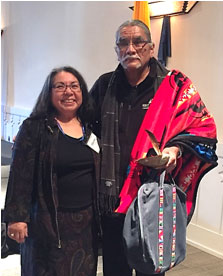 Dr. Dolores Subia Bigfoot, Director of the OJJDP Tribal Youth Training and Technical Assistance Center, with invited guest Thomas Goodluck.
Dr. Dolores Subia Bigfoot, Director of the OJJDP Tribal Youth Training and Technical Assistance Center, with invited guest Thomas Goodluck.
Photo courtesy of Natalie Stites.
“We are here today to help you get your Tribal Youth Program or Juvenile Healing to Wellness Court grants off to a good start,” said OJJDP Deputy Administrator Eileen M. Garry in her opening remarks at the March 13–15, 2018, meeting in Albuquerque, NM. More than 100 grantees attended the training hosted by OJJDP’s Tribal Youth Training and Technical Assistance (TTA) Center. “We designed this gathering to serve you and the needs of your programs,” Ms. Garry said. “Our hope is that you will leave Albuquerque with a clear vision of where you want your program to go and the steps you will take to accomplish your goals.”
The meeting began with a traditional opening by Thomas Goodluck, a licensed drug and alcohol counselor and member of the Diné Navajo tribe, and included remarks from Dr. Dolores Subia Bigfoot, director of the Tribal Youth TTA Center. Dr. Evan Elkin, executive director at Reclaiming Futures, spoke about the complex role youth justice systems play in achieving public health and well-being and tribal representatives and former grantees shared their program experiences and lessons learned on building effective programs for youth.
Grantees attended sessions on creating mission and vision statements, community advisory committees, logic models, SMART (Specific, Measurable, Attainable, Relevant, and Timely) goals and objectives, developing comprehensive data collection and evaluation plans, and planning for sustainability. OJJDP Grant Program Specialists Keisha Kersey and Kara McDonagh shared key aspects of effective grant management. The meeting ended with a session on trauma-informed care and the core principles for justice improvement. OJJDP Deputy Associate Administrator Jeffrey Gersh provided closing remarks.
On February 13–14, 2018, 15 Alaska-based CTAS grantees attended a state-specific strategic planning training in Anchorage, AK. The training was hosted by the Rural Alaska Community Action Program’s (RurAL CAP's) Resource Basket Training and Technical Assistance Center.
Following a traditional opening by Native Village of Nulato member Robert Ruzicka, RurAL CAP staff members Tara Stiller, Greg Anelon, Amy Modig, and Joel Turman facilitated workshops on developing mission and vision statements, community advisory committees, logic models, SMART goals and objectives, data collection, evaluation, and sustainability.
Dorothy Edwardsen, Chief Judge and Tribal Court Administrator from the Native Village of Barrow, and attorney Kimberly Martus spoke with attendees about building effective tribal youth court systems in Alaska. Resource Basket TTA Center Director Cathie Clements presented on Alaska’s promising positive youth development strategies and resources available to tribes. The event also afforded participants many opportunities for peer learning during which grantees reflected on their programs’ common challenges and effective strategies to successfully implement programs for Alaska Native youth.
OJJDP will provide ongoing training and technical assistance to the grantees via webinars and other resources available through the Tribal Youth TTA Center and the Resource Basket. Although the TTA centers work extensively with OJJDP grantees, they also provide TTA, including access to free virtual simulation trainings, to federally recognized tribes that are not grantees.
Resources:
Additional information about the Office’s tribal youth programs and services is available on the OJJDP website.
